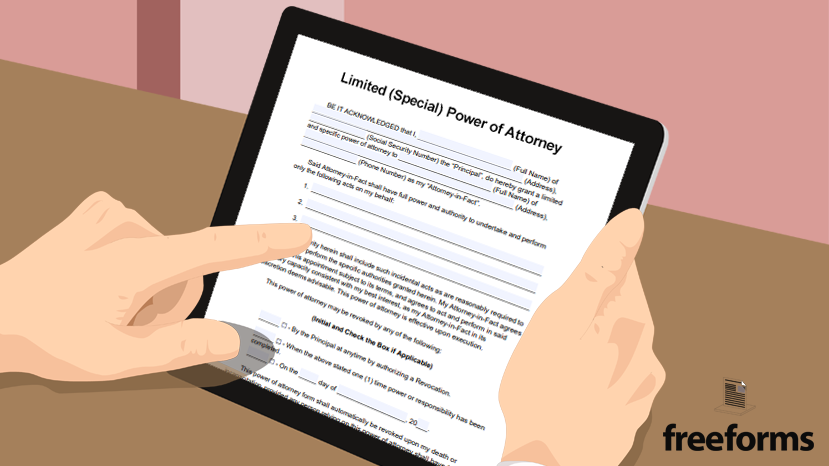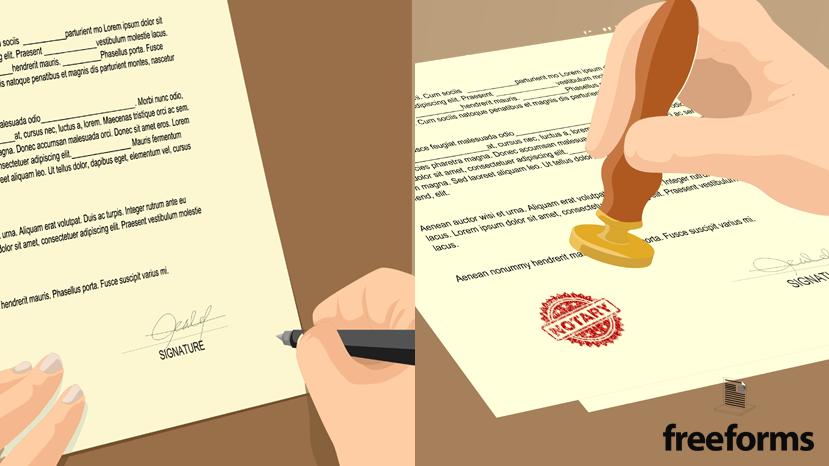
The Limited (Special) Power of Attorney caters to those who wish to grant powers to a trusted agent to conduct specific functions in their name. The designated acts can vary in magnitude depending on the principal’s needs, some requiring simple tasks to be executed, with others utilizing the form for more large-scale performances. This document can adopt various features of other popular POAs, making it a highly customizable legal form. Parties interested in conveying a limited power of attorney may do so by listing the assigned duties within the form, providing any restrictions of this access, and concluding the transfer of rights by signing the instrument as indicated.
Signing Requirements – To officially guarantee a satisfactory contract, the user must sign before a licensed notary public. Review the listed state-specific endorsement obligations, and associated laws found below before applying signatures to the paperwork.
A limited power of attorney allows an individual to grant legal authority to another person regarding a defined area or specified act. The issuing party or “principal” essentially endows the receiving “agent” with temporary permission to perform cited actions on their behalf. The contract can bestow the identified privileges to effectively expire on an indicated date or upon completion of a particular task. The arrangement can alternatively be instated as “springing”, meaning that the powers only go into effect should a triggering situation occur, such as the death or incapacitation of the principal.
Utilizing a limited POA can be beneficial in scenarios where the declarant is absent for an extended period or under circumstances where health problems impede their ability to conduct necessary transactions. Refer to your state’s statutes listed below before endorsing to ensure the execution of the document meets the associated signing requirements.

Since a limited POA agreement is highly adaptable, mapping out the exact privileges needed for distribution in advance would be prudent. The granted permissions should be restricted to allow the agent to carry out the necessary task without extending nonessential powers. The accord’s termination can also be defined explicitly in the paperwork by instituting an expiration date or completion of the agent’s performance.

The nomination of an attorney-in-fact should be carefully considered before issuing the desired controls. It is advised that the principal party only bestow assigned authority to an individual deemed trustworthy and responsible. A reliable family member, close friend, or credible professional may present viable options to receive authorized agency.

Select the corresponding link for your state to acquire the correct form to issue the designated powers of attorney. Once redirected to the desired state-specific limited POA page, the document (PDF or MS Word Doc) can be downloaded or printed. The contract can additionally be filled out on the FreeForms website by selecting the “Fill Now” feature.
After obtaining the correct form, fill in the blanks with the related transaction information. Provide precise language in detail to issue only the controls that are necessary to complete the assigned task. Establish the termination method for the agreement, either upon fulfillment of the indicated performance or arrival of a confirmed expiration date.

After the paperwork has been sufficiently filled as directed, it will then need to be signed by the participants to legitimize the commitment. In addition to state-specific forms, each state has varying legislation regarding endorsement verification for POA documents. Review the signing requirements below to determine if a licensed notary or witness(es) will need to be present when singing. In cases where there is no legal mandate in place, it is recommended that the event be notarized to further validate the contract’s execution.

Once the document is finalized, it is advised that all included parties receive a copy of the paperwork to retain for reference. The attorney-in-fact will then be an active representative for the principal and permitted to carry out the denoted tasks by presenting the POA to the associated establishment (e.g., the DMV or a Bank). When signing on behalf of the declarant, the agent will need to indicate authority by writing “Acting as POA” alongside their signature in the appropriate space.
| STATE | SIGNING REQUIRMENTS | POWER OF ATTORNEY LAWS |
|---|---|---|
| Alabama | Notary Public | Code of Alabama – Title 26, Chapter 1A (Alabama Uniform Power of Attorney Act) |
| Alaska | Notary Public | Alaska Statutes – Title 13, Chapter 26 – Protection of Minors and Incapacitated Persons and Their Property; Powers of Attorney |
| Arizona | Notary Public and One (1) Subscribing Witness | Arizona Revised Statutes – Title 14, Chapter 5, Article 5: Powers of Attorney |
| Arkansas | Notary Public | Arkansas Code – Title 28, Subtitle 5, Chapter 68 – Uniform Power of Attorney Act |
| California | Notary Public or Two (2) Subscribing Witnesses | California Probate Code: Division 4.5. Powers of Attorney (§ 4000 – 4545) |
| Colorado | Notary Public | Colorado Uniform Power of Attorney Act (§ 15-14-7) |
| Connecticut | Notary Public or Two (2) Subscribing Witnesses | Chapter 15c: Connecticut Uniform Power of Attorney Act |
| Delaware | Notary Public and One (1) Subscribing Witness | Title 12, Chapter 49A: Durable Personal Powers of Attorney Act |
| Florida | Notary Public or Two (2) Subscribing Witnesses | Chapter 709: Powers of Attorney and Similar Instruments |
| Georgia | Notary Public and One (1) Subscribing Witness | Georgia Power of Attorney Act (O.C.G.A. § 10-6B-1) |
| Hawaii | Notary Public | Chapter 551E: Uniform Power of Attorney Act |
| Idaho | Notary Public | Title 15, Chapter 12: Uniform Power of Attorney Act |
| Illinois | Notary Public and One (1) Subscribing Witness | Illinois Power of Attorney Act (755 ILCS 45) |
| Indiana | Notary Public | Title 30, Article 5: Powers of Attorney (§ 30-5) |
| Iowa | Notary Public | Powers of Attorney (Chapter 633B) |
| Kansas | Notary Public | Chapter 58, Article 6: Powers and Letters of Attorney |
| Kentucky | Notary Public | Kentucky Uniform Power of Attorney Act (Chapter 457) |
| Louisiana | Notary Public or Two (2) Subscribing Witnesses | Louisiana Civil Code – Chapter 2. Mandate |
| Maine | Notary Public | Title 18-C, Article 5, Part 9: Maine Uniform Power of Attorney Act |
| Maryland | Notary Public and Two (2) Subscribing Witnesses | Maryland Power of Attorney Act (§ 17-101 – § 17-204) |
| Massachusetts | Notary Public | Chapter 190B, Article V: Sections 5-501 – 5-507 |
| Michigan | Notary Public or Two (2) Subscribing Witnesses | Durable Power of Attorney: Sections 700-5501 – 700-5505 |
| Minnesota | Notary Public | Chapter 523: Powers of Attorney |
| Mississippi | Notary Public | Mississippi Uniform Durable Power of Attorney Act (§ 87-3-101 – § 87-3-113) |
| Missouri | Notary Public or Two (2) Subscribing Witnesses | Durable Power of Attorney Law of Missouri (§ 404.700 – § 404.737) |
| Montana | Notary Public | Montana Uniform Power of Attorney Act (§ 72-31-301 – 72-31-367) |
| Nebraska | Notary Public | Nebraska Revised Statutes – Uniform Power of Attorney Act (§ 30-4041 – 30-4045) |
| Nevada | Notary Public | Nevada Revised Statutes – Power of Attorney (Uniform Act) (§ 162A.010 – 162A.660) |
| New Hampshire | Notary Public | New Hampshire Statutes – Uniform Power of Attorney Act (§ 564-E:101 – 564-E:403) |
| New Jersey | Notary Public | New Jersey Revised Statutes – Revised Durable Power of Attorney Act (§ 46-2B-8.1 – 46-2B-19) |
| New Mexico | Notary Public | New Mexico Statutes – Uniform Power of Attorney Act (§ 45-5B-101 – 45-5B-403) |
| New York | Notary Public and Two (2) Subscribing Witnesses | Consolidated Laws of New York – Chapter 24A – Article 5 – Statutory Short Form and Other Powers of Attorney For Financial and Estate Planning (§ 5-1501 – 5-1514) |
| North Carolina | Notary Public | North Carolina General Statutes – Chapter 32C – Uniform Power of Attorney Act (§ 32C-1-101 – 32C-4-403) |
| North Dakota | Soley Requires Signature of Principal; Corroboration from Notary Public Recommended | North Dakota Century Code Title 30, Chapter 30.1-30 – Uniform Durable Power of Attorney Act (§ 30.1-30-01 – 30.1-30-06) |
| Ohio | Notary Public | Ohio Revised Code Chapter 1337: Power of Attorney (§ 1337.01 – 1337.64) |
| Oklahoma | Notary Public | Oklahoma Statutes Citationized Title 58 Chapter 29 – Uniform Power of Attorney Act (58 O.S. § 3001 – 3045) |
| Oregon | Soley Requires Signature of Principal; Corroboration from Notary Public Recommended | Oregon Revised Statutes Title 13, Chapter 127 – Powers of Attorney (127.002 – 127.045) |
| Pennsylvania | Notary Public and Two (2) Subscribing Witnesses | Pennsylvania Statutes Title 20, Chapter 56 – Powers of Attorney |
| Rhode Island | Notary Public | Rhode Island Short Form Power of Attorney Act (§ 18-16) |
| South Carolina | Notary Public and Two (2) Subscribing Witnesses | South Carolina Uniform Power of Attorney Act (§ 62-8) |
| South Dakota | Notary Public | South Dakota Uniform Power of Attorney Act (§ 59-12-1 – § 59-12-43) |
| Tennessee | Notary Public or Two (2) Subscribing Witnesses | Tennessee Code Annotated Chapter 6: Power of Attorney (§ 34-6) |
| Texas | Notary Public | Texas Statutes – Title 2, Chapter 751: Durable Power of Attorney Act |
| Utah | Notary Public | Utah Code – Uniform Power of Attorney Act (§ 75-9) |
| Vermont | Notary Public and One (1) Subscribing Witness | Vermont Statutes – Chapter 123: Powers of Attorney (14 V.S.A. § 3501 – 14 V.S.A. § 3516) |
| Virginia | Notary Public | Virginia Uniform Power of Attorney Act (C.O.V § 64.2-1600 – § 64.2-1642) |
| Washington | Notary Public or Two (2) Subscribing Witnesses | Revised Code of Washington – Uniform Power of Attorney Act ( § 11-125-010 – § 11-125-903) |
| West Virginia | Notary Public | West Virginia Code – Uniform Power of Attorney Act (§ 39B-1-101 – § 39B-4-103) |
| Wisconsin | Notary Public | Wisconsin Statutes – Uniform Power of Attorney for Finances and Property (§ 244-01 – 244-64) |
| Wyoming | Notary Public | Wyoming Statutes – Uniform Power of Attorney Act (§ 3-9-101 – 3-9-403) |
The manner in which a limited POA can be revoked will depend on how the controls were initially issued within the language contract. When first establishing the agreement, the principal can elect to institute an automatic termination provision to take effect upon:
If the declarant would rather keep the arrangement in place without utilizing one of these clauses, they can alternatively cancel the commitment with a separate document. Annulment of the original limited POA can be attained by completing and delivering a Revocation of Power of Attorney Form. The accord also becomes void in the event of the death or incapacitation of the principal or agent.